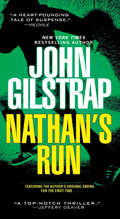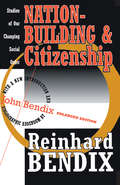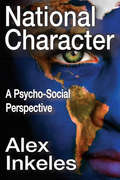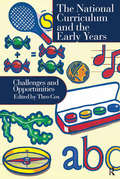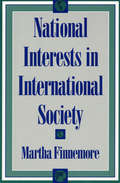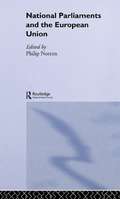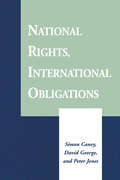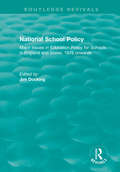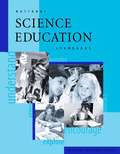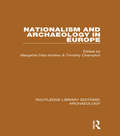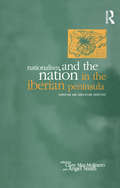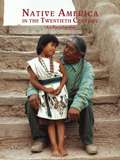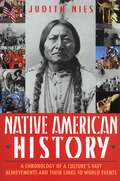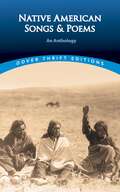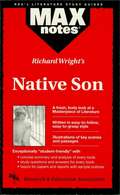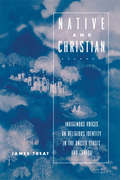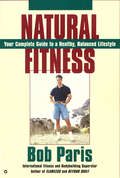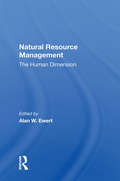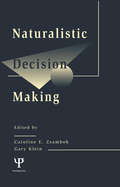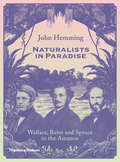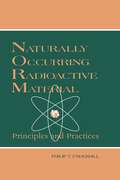- Table View
- List View
Nathan's Run: A Thriller By The Author Of Even Steven And Nathan's Run
by John GilstrapAn innocent boy is on the run from the law and a ruthless assassin in the New York Times bestselling author&’s &“heart-pounding tale of suspense&” (People). After a guard is murdered at a juvenile detention center and one of the inmates is found missing, it appears that Nathan Bailey has graduated from car thief to cold-blooded killer. Now the subject of a nationwide manhunt, Nathan is the most wanted fugitive in America—and only twelve years old. But Nathan is also the target of another kind of hunt. After escaping his corrupt uncle and killing that guard in self-defense, he has more to fear than legal prosecution. He&’s also the target of a savage hit man. To survive he has only himself, his smarts, and his honesty to depend on. But will that be enough as he takes on a world of violence beyond his comprehension?"Fast, intriguing . . . a clever plot with enough menace to keep readers on the edge of their seats." —Boston Herald
Nation-Building and Citizenship: Studies of Our Changing Social Order
by Reinhard BendixNation-Building and Citizenship examines how states and civil societies interact in their formation of a new political community. Reinhard Bendix directs our attention to relations established between individual and state during nation-building. While the development of citizenship and the interplay between tradition and modernity are important in this process of social and political change, his key theme is the examination of authority patterns.Bendix explores in depth the possibilities of an alternative approach to the neo-evolutionary orientation many social scientists take in their analyses of the underdeveloped areas of the world. The subjects he discusses include transformations of Western European societies since medieval times, extension of citizenship to the lower classes, bureaucratization in the nation-state, private and public authority in Western Europe and Russia, aristocracies and development in Germany and Japan, and the development of public authority in India's political community. The book concludes with a reconsideration of ideas widely held about tradition, modernity, and modernization.In a new introduction, John Bendix writes that what continues to make this book relevant is not only what it can tell us about past and present nation-building, including the transformations of the 1980s and 1990s, but its more general messages about the nature of social and political transformations. Nation-Building and Citizenship is a necessary addition to the libraries of political scientists, sociologists, historians, and scholars of comparative studies.
National Bank of Poland
by Piero UgoliniPoland was the first centrally planned economy in Eastern Europe to leave the Soviet bloc and introduce systemic reforms in all sectors of the economy. the transformation of the National Bank from a monobank to an institution of a market-based system and the Polish financial sector into a market-oriented banking system was an important element of the reform process and received strong support from the IMF and the international community. This paper describes the steps taken by the National Bank, analyzes the monetary situation, and makes recommendations.
National Character: A Psycho-Social Perspective
by Alex InkelesSeen in modern perspective, the concept of national character poses fundamental problems for social science theory and research: To what extent do conditions of life in a particular society give rise to certain patterns in the personalities of its members? What are the consequences?Alex Inkeles surveys various definitions of national character, tracing developments through the twentieth century. His approach is to examine the regularity of specific personality patterns among individuals in a society. He argues that modal personality may be extremely important in determining which new cultural elements are accepted and which institutional forms persist in a society. Reviewing previous studies, Inkeles canvasses the attitudes and psychological states of different nations in an effort to discover a set of values in the United States. He concludes that, despite recent advances in the field, there is much to be done before we can have a clear picture of the degree of differentiation in the personality structure of modern nations.Until now, there were few formal definitions and discussions on national character and the limits of this field of study. This book will be of great interest to psychologists, sociologists, philosophers, and political theorists.
National Cultures and Work-Related Values, The Hofstede Study
by Herminia IbarraPeople from different national cultures often operate under different assumptions about what is appropriate behavior. In organizational settings, these cultural differences in underlying assumptions can significantly affect interactions when individuals from various nationalities meet. This note describes a landmark study by Geert Hofstede of the impact of national culture on the work-related attitudes and values of IBM employees in 40 countries.
National Curriculum In The Early Years: Challenges And Opportunities
by Theo CoxThe child-centred principles of early years education - which emphasize play and holistic learning - are being challenged by the implementation of a subject-based National Curriculum. The contributors to this book explore this challenge and offer some ways of meeting it practically and productively. Issues covered include: pedagogical issues, such as the cross-curricular, topic-based teaching; teacher's attitudes to subject knowledge; assessment issues, including baseline assessment at the age of five; and parental attitudes to the National Curriculum and its content at Key Stage 1.
National Income Accounting
by Robert E. KennedyIntroduces the concept of national income accounting. This note: 1) defines GDP and provides examples; 2) discusses the differences between GDP and GNP; 3) presents both the expenditure and income decompositions of GDP; and 4) defines the relationships among net savings, net exports, and the fiscal debate.
National Interests in International Society
by Martha FinnemoreHow do states know what they want? Asking how interests are defined and how changes in them are accommodated, Martha Finnemore shows the fruitfulness of a constructivist approach to international politics. She draws on insights from sociological institutionalism to develop a systemic approach to state interests and state behavior by investigating an international structure not of power but of meaning and social value. An understanding of what states want, she argues, requires insight into the international social structure of which they are a part. States are embedded in dense networks of transnational and international social relations that shape their perceptions and their preferences in consistent ways. Finnemore focuses on international organizations as one important component of social structure and investigates the ways in which they redefine state preferences. She details three examples in different issue areas. In state structure, she discusses UNESCO and the changing international organization of science. In security, she analyzes the role of the Red Cross and the acceptance of the Geneva Convention rules of war. Finally, she focuses on the World Bank and explores the changing definitions of development in the Third World. Each case shows how international organizations socialize states to accept new political goals and new social values in ways that have lasting impact on the conduct of war, the workings of the international political economy, and the structure of states themselves.
National Parliaments and the European Union
by Philip NortonThis guide is intended for busy legal practitioners and all other professionals who are involved in the criminal justice system and who require quick reference to the provisions of the 1994 Act.
National Rights, International Obligations
by Simon CaneyNationalism is once again rising and spreading. Nationlist movements are active throughout the world, demanding political recognition of their nations' identity. Yet the current revival of nationalism has taken place alongside claims that nation-states are becoming obsolete in an increasingly globalized world. In addition, now perhaps more than ever, people are conscious of humanity as a whole and are ready to take seriously the international dimensions of morality.In this collection of timely essays, distinguished moral and political philosophers examine issues raised by the competing claims of nationhood and internationalism from a variety of perspectives, and defend a variety of answers. Questions discussed include: Is humanity really divided into nations or are nations invented by nationalists? Does a nation have the right to be self-determining? If so, must each nation form a separate and sovereign state? Do our obligations stop at national boundaries? Do we not have obligations to human beings as such? Why then should we be less concerned about ?foreigners? than about our compatriots? Can we be concerned for social justice within societies yet not across the world as a whole? If we embrace ideas of human rights and global obligations, how do we establish what those rights and obligations actually are? Is it proper, plausible, or practical to aspire to such universal moral principles in a world characterized by national diversity and cultural difference?
National School Policy: Major Issues in Education Policy for Schools in England and Wales, 1979 onwards (Routledge Revivals)
by Jim DockingPublished in 1996, this book presents a broad overview of the development of educational policy for schools in England and Wales since Margaret Thatcher’s Conservative administration took office in 1979. It reviews the separate strands of education policy as it relates to curriculum, equal educational opportunities, diversity and choice and management policies, and combines these with an overall appraisal of the direction of the schools system in the two decades before it was written. The book thereby provides a comprehensive text for undergraduate and postgraduate students which raises issues for debate and includes support material for discussion. It will also be of interest to school governors, educationalists and all those who care about the direction of educational change.
National Science Education Standards
by National Research Council StaffAmericans agree that our students urgently need better science education. But what should they be expected to know and be able to do? Can the same expectations be applied across our diverse society? These and other fundamental issues are addressed in National Science Education Standards--a landmark development effort that reflects the contributions of thousands of teachers, scientists, science educators, and other experts across the country. The National Science Education Standards offer a coherent vision of what it means to be scientifically literate, describing what all students regardless of background or circumstance should understand and be able to do at different grade levels in various science categories. The standards address: The exemplary practice of science teaching that provides students with experiences that enable them to achieve scientific literacy. Criteria for assessing and analyzing students' attainments in science and the learning opportunities that school science programs afford. The nature and design of the school and district science program. The support and resources needed for students to learn science. These standards reflect the principles that learning science is an inquiry-based process, that science in schools should reflect the intellectual traditions of contemporary science, and that all Americans have a role in improving science education. This document will be invaluable to education policymakers, school system administrators, teacher educators, individual teachers, and concerned parents.
Nationalism and Archaeology in Europe (Routledge Library Editions: Archaeology)
by Timothy Champion Margarita Díaz-AndreuArchaeologists from many different European countries here explore the very varied relationship between nationalistic ideas and archaeological activity through the course of the nineteenth and twentieth centuries. The resurgence of nationalism was one of the most prominent features of the European political scene in the 1990s, when this book was originally published. The past provides a large supply of ideas and images to support the claims of national identity deeply rooted in remote generations. The remote past revealed by archaeology also plays a part – heroes, heroines, golden ages long disappeared, objects to admire, and sites to provoke the memory, all called on to further the cause of nationalism. Drawing on the authoritative insights of the indigenous contributors, this book examines the issues throughout modern Europe. All of the chapters share a concern to see archaeology and the study of the past as intimately related to contemporary social and political questions. The present shapes the way we think about the past but the past also provides us with evidence for thinking about the present. These issues are timeless and this comprehensive examination of a host of issues remains important for historians and those pursuing nationalistic politics.
Nationalism and the Nation in the Iberian Peninsula: Competing and Conflicting Identities
by Clare Mar-Molinero; Angel SmithNationalism has recently been the focus of considerable interest, but relatively little is known about nation-building and competing identities in Spain and Portugal. In examining the roots of Iberian nationalism, and the conflicts and tensions which have come to the fore in the twentieth century, this timely collection offers a broad interdisciplinary base and socio-historical context through which to understand the region's nationalist challenges. Topics include:- how nationalism is constructed and used as a tool by political groups;- how language is used as a nationalist emblem; and- how cultural representations of nationalism manifest themselves at both a popular level and at the level of elites.This book will provide a welcome addition to Iberian studies and invaluable insights for students and specialists alike.
Native America in the Twentieth Century: An Encyclopedia
by Mary B. Davis Joan Berman Mary E. Graham Lisa A. MittenFirst Published in 1996. Articles on present-day tribal groups comprise more than half of the coverage, ranging from essays on the Navajo, Lakota, Cherokee, and other large tribes to shorter entries on such lesser-known groups as the Hoh, Paugusett, and Tunica-Biloxi. Also 25 inlcludes maps.
Native American History: A Chronology of a Culture's Vast Achievements and Their Links to World Events
by Judith NiesA NEW PERSPECTIVE ON NATIVE AMERICAN HISTORY:A CHRONOLOGICAL ACCOUNT OF ITS PLACE ON THE WORLD STAGE.Native American History is a breakthrough reference guide, the first book of its kind to recognize and explore the rich, unfolding experiences of the indigenous American peoples as they evolved against a global backdrop. This fascinating historical narrative, presented in an illuminating and thought-provoking time-line format, sheds light on such events as:* The construction of pyramids--not only on the banks of the Nile but also on the banks of the Mississippi * The development of agriculture in both Mesopotamia and Mexico* The European discovery of a continent already inhabited by some 50 million people * The Native American influence on the ideas of the European Renaissance* The unacknowledged advancements in science and medicine created by the civilizations of the new world* Western Expansion and its impact on Native American land and traditions* The key contributions Native Americans brought to the Allied victory of World War II And much more!This invaluable history takes an important first step toward a true understanding of the depth, breadth, and scope of a long-neglected aspect of our heritage.From the Trade Paperback edition.
Native American Songs and Poems: An Anthology (Dover Thrift Editions: Poetry Ser.)
by Brian SwannWonderful collection of authentic traditional songs and contemporary Indian verse composed by Seminole, Hopi, Navajo, Pima, Arapaho, Paiute, Nootka, other Indian writers and poets. Topics include nature's beauty and rhythms, themes of tradition and continuity, the Indian in contemporary society, much more.
Native Son (MAXNotes Literature Guides)
by Richard BucciREA's MAXnotes for Richard Wright's Native Son MAXnotes offer a fresh look at masterpieces of literature, presented in a lively and interesting fashion. Written by literary experts who currently teach the subject, MAXnotes will enhance your understanding and enjoyment of the work. MAXnotes are designed to stimulate independent thought about the literary work by raising various issues and thought-provoking ideas and questions. MAXnotes cover the essentials of what one should know about each work, including an overall summary, character lists, an explanation and discussion of the plot, the work's historical context, illustrations to convey the mood of the work, and a biography of the author. Each chapter is individually summarized and analyzed, and has study questions and answers.
Native and Christian: Indigenous Voices on Religious Identity in the United States and Canada
by James TreatNative and Christian is an anthology of essays by indigenous writers in the United States and Canada on the problem of native Christian identity. This anthology documents the emergence of a significant new collective voice on the North American religious landscape. It brings together in one volume articles originally published in a variety of sources (many of them obscure or out-of-print) including religious magazines, scholarly journals, and native periodicals, along with one previously unpublished manuscript.
Natural Childbirth the Bradley Way
by Susan Mccutcheon Illustrated by Erick Ingraham"Instead of distracting yourself from the birth process. . . you are fully mindful and wholly engaged during Bradley's method of natural childbirth. " -Natural Life magazine The Bradley Method, used and praised by women for more than thirty years, prepares couples for drug- and surgery-free natural childbirth. Many births today are still medicated, forceped, or Caesarean--not natural. The Bradley Method changes all that for couples who wish to give birth in a relaxed, warm, loving environment that maximizes the joy of the birth experience--and puts the mother in control. Certified childbirth educator Susan McCutcheon, one of Dr. Bradley's first students, now makes this natural approach to childbirth more accessible than ever to American women. You will learn: #65533; The crucial differences between the Bradley Method and Lamaze--and why you may end up medicated with the latter #65533; How to choose a doctor who will respect your wishes for natural childbirth #65533; Exercises and nutrition to get your body ready for birthing #65533; How to involve your partner as a birth coach and a fully engaged participant #65533; The truth about episiotomy, Caesarean surgery, and other routine medical interventions that may pose needless risk to your baby "Robert Bradley put power in patients' hands, reducing the number of Caesarean sections and episiotomies he performed and playing up natural ways of making childbirth less painful. " -Slate "The Bradley Method's simple objective, through relaxation, breathing, and visualization, is a birth free of the interventions frequently offered to women in the different stages of childbirth: fetal monitors, drug-induced labor, anesthesia, episiotomy, and Caesarean section. [Its] other defining feature, the husband's active participation in the delivery, is critical to this overall goal of an intervention-free birth. " -Mothering magazine
Natural Fitness: Your Complete Guide to a Healthy, Balanced Lifestyle
by Bob Jackson-ParisIf you want to keep trim, fit, and healthy without spending endless hours each day on routines and diets, then this is the book for you. Bodybuilding superstar and fitness expert Bob Paris believes that you can achieve whole-body fitness that transcends superficiality. The key to his proven program is to balance the three essential parts of your nature: physical body, mind, and spirit. Let Bob show you how to set fitness goals and priorities into a realistic plan, inspire long-term motivation, and reframe new goals as your needs change; exercise properly and effectively with a detailed step-by-step exercise program; maintain healthful eating habits with practical tips on diet and nutrition, including more than 20 favorite energizing meals with calorie menus; incorporate new knowledge into your life to make your fitness belief system work for you - and keep it working for a lifetime; and respect your body - abandon negative beliefs, embrace positive ideas about nutrition and fitness, and integrate them into everyday life.
Natural Resource Management: The Human Dimension
by Alan W EwertWritten by and for scholars, planners, and policymakers, Natural Resource Management: The Human Dimension focuses on issues such as the publics role in the decision-making processes of ecosystem management that affect how we use (or abuse) resources. It exposes the reader to a wide variety of applications of Human Dimensions Research, as well as to significant issues involved. One of the greatest needs in natural resource management is for a deeper understanding of the intricate relationship between humans and the natural environment. Human Dimensions Research, an interdisciplinary field involving a broad variety of social science approaches, seeks to fill this need by providing multidimensional assessments of peoples’ behavior, attitudes, and expectations toward natural resources and their uses. Written by and for scholars, planners, and policymakers, Natural Resource Management: The Human Dimension focuses on issues such as the publics role in the decision-making processes of ecosystem management that affect how we use (or abuse) resources. It exposes the reader to a wide variety of applications of Human Dimensions Research, as well as to significant issues involved. At a time when we are either loving our forests and parks to death or paving them over, a better understanding of the problems is critical if we are to create workable policies that will preserve and protect our natural resources
Naturalistic Decision Making (Expertise: Research and Applications Series)
by Gary Klein Caroline E. ZsambokIf you aren't using the term naturalistic decision making, or NDM, you soon will be. Even as a very young field, NDM has already had far-reaching applications in areas as diverse as management, aviation, health care, nuclear power, military command and control, corporate teamwork, and manufacturing. Put simply, NDM is the way people use their experience to make decisions in the context of a job or task. Of particular interest to NDM researchers are the effects of high-stake consequences, shifting goals, incomplete information, time pressure, uncertainty, and other conditions that are present in most of today's work places and that add to the complexity of decision making. Applications of NDM research findings target decision aids and training that help people in their decision-making processes. This book reports the findings of top NDM researchers, as well as many of their current applications. In addition, the book offers a historical perspective on the emergence of this new paradigm, describes recent theoretical and methodological advancements, and points to future developments. It was written for people interested in decision making research and applications relative to a diverse array of work settings and products such as human-computer interfaces, decision support systems, individual and team training, product designs, and organizational development and planning.
Naturalists in Paradise: Wallace, Bates and Spruce in the Amazon
by John HemmingThe thrilling stories of the three pioneering English naturalists' explorations and discoveries in the world's richest ecosystem One hundred and fifty years ago, the young naturalists Alfred Wallace, Henry Walter Bates, and Richard Spruce were on a journey. Their destination, Amazonia--the world's largest tropical forest with the greatest river system and richest ecosystem--was then an almost-undiscovered environment to Western explorers and scientists. In Naturalists in Paradise, Amazon expert John Hemming weaves the riveting stories of these three men's experiences in the Amazon and assesses their valuable research that drastically changed our conception of the natural world. Each of the three naturalists is famous for a particular discovery: Wallace is credited, along with Charles Darwin, for developing the theory of evolution; Bates uncovered the phenomenon of protective mimicry among insects; and Spruce transported the quinine-bearing Cinchona tree to India, saving countless lives from malaria. Drawing on the letters and books of the three naturalists, Hemming reaches beyond the well-known narratives, offering unrivaled insight into the often lawless frontier life in South America as seen through the lives of the great pioneers of modern disciplines: anthropology, tribal linguistics, archaeology, and every branch of natural science.
Naturally Occurring Radioactive Materials: Principles and Practices
by T.Rick IrvinManagement of Naturally Occurring Radioactive Materials - known in the industry as NORM -has become an important part of the regular training required for workers in oil and gas production, refinery and petrochemical manufacturing, and in certain types of mining. Proper handling of NORM-contaminated wastes and use of appropriate radiation detection and protective equipment are now understood to be important components of good worker safety programs. Until now, no practical, easy-to-read, book was available to supplement worker training courses on NORM management. Naturally Occurring Radioactive Materials: Principles and Practices fills this void by providing, in a single publication, an ideal reference for industry managers, supervisors and line personnel. The book stresses the proper handling and management of NORM contaminated wastes and provides a firm understanding of the chemical properties of radioactive agents, their toxicological effects, and the appropriate containerization and disposal methods for these materials.
